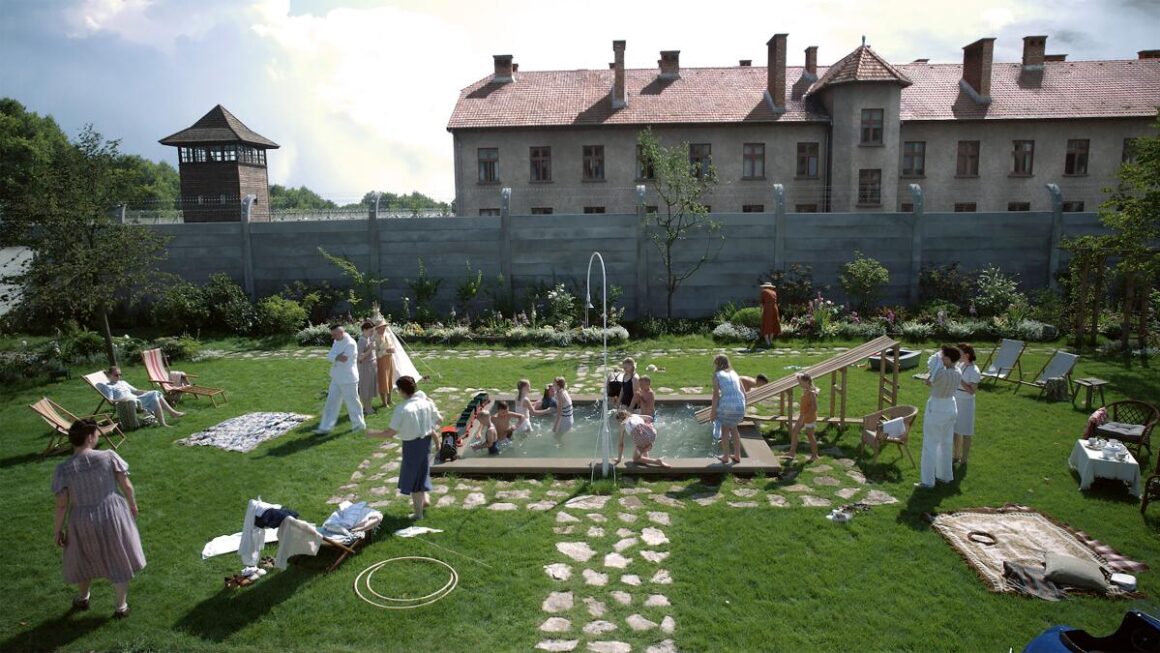Reviewed by Robert Cosgrave
In the nearly 80 years following the end of the Second World War, Nazism has been depicted so many times on screen that one could ask whether there was any point in another film showing the monstrous crimes committed by the Third Reich. Jonathan Glazer’s The Zone of Interest shows, however, that there remains much that can be said about the horrors of the Nazis on screen.
The film centres on Rudolf Höss, Commandant of Auschwitz Concentration Camp, and his wife Hedwig, played excellently by Christian Friedel and Sandra Hüller. The Höss family enjoys an idyllic life in their villa with its resplendent gardens, and they go swimming in the river nearby. Hedwig’s life, in particular, appears to emerge fully from the dreams of a TikTok “trad wife”. This is a life they live quite literally right outside the gates of Auschwitz. Throughout many of the scenes of fascist domesticity, the horrific sounds of the industrialised mass murder that took place in the camps can be heard.
The soundscape proves particularly impactful if one can see the film in a cinema. The family are presented throughout as the model German settlers of the East. When Hitler said, “our Mississippi must be the Volga”, it was the genocidal and imperialist efforts of those like Höss he had in mind. Like in all imperialist plunders, figures like Höss make sure they get their spoils – Hedwig has first refusal on all clothing, jewellery and makeup stolen from the camp inmates upon arrival.
Their household is dependent upon the labour of young Polish women press-ganged in from the area who the family routinely abuses. The Belgian Marxist Ernest Mandel described his experience in a different concentration camp, in which the inmates were used as free labour for a chemical factory, as “a microcosm of European society under the Nazis”. The Höss household at Auschwitz can equally be described as such.
Höss can conduct much of his business as camp Commandant from home. In one particularly effective scene, they meet with a representative from a prominent industrial group who explains to them how they have manufactured a crematorium that would prove especially efficient in the disposal of the bodies of those murdered in the camps. From this scene as well as others, we see how thoroughly enmeshed German capitalism was with the depravity of the Nazi regime. Not only were capitalists providing the machinery and equipment that allowed genocide to take place according to the most modern techniques, but they also directly profited from the camps – as is mentioned in an offhand comment by another housewife friend of Hedwig’s, about how Siemens (still a multinational manufacturer worth billions) has opened a plant in Auschwitz. And they were not the only ones.
In another equally chilling scene, Höss is at the headquarters of the SS in the Berlin suburb of Oranienburg – also the site of one of the earliest concentration camps. The meeting, conducted again to the letter of a businesslike atmosphere, discusses the new stages of the genocide of Europe’s Jewish population, beginning with the deportation of hundreds of thousands of Hungarian Jews to Auschwitz. For this Höss is deemed instrumental and it is for him his greatest triumph. Reviewers from the Irish Times, The New York Times, and The Guardian all see Höss through the lens of Hannah Arendt’s comment about “the banality of evil”, however this, in many senses, undersells the barbaric nature of Höss and others.
The Nazi project was, above all else, a mass movement of counter-revolution aimed at destroying every aspect of social progress internationally, in particular the socialist movement in Europe and the USSR, and the Jewish population which they saw as the source of this movement. In this, Höss, like millions of others was a true believer. A veteran of the proto-fascist Freikorps paramilitary, first in the Baltic states against the Red Army, later against the workers of the Ruhr area in Germany – the centre of revolutionary movements led by mine workers – Höss would join the Nazis as early as 1922. In this project, the Nazis were supported from the beginning by the summits of German industry, shaken to their core first by the October Revolution that brought the working class to power in Russia in 1917, and later by the revolutionary period in Germany from 1918-1923. German capitalists would support any group that would help them maintain their profits and their property.
Anyone watching the film today cannot help but think of the ongoing genocide in Gaza and the unending stream of horrors being committed by the Israeli regime against Palestinians. That such abominable atrocities are still happening in the 21st century speaks volumes about the barbaric nature of the capitalist world we live in.
In showing the Third Reich not as an aberration but as the result of the monstrous system of imperialism, racism and capitalism, The Zone of Interest is to be commended and should be watched by as broad an audience as possible, notwithstanding the highly disturbing subject matter.












